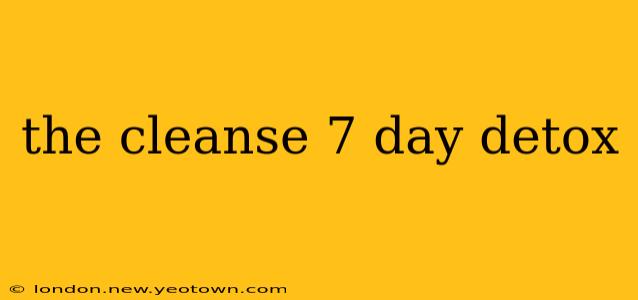The idea of a "cleanse" or "detox" often conjures images of restrictive diets and intense regimens. But what does a 7-day detox really entail, and is it the right choice for you? This isn't about quick fixes or fad diets; it's about understanding the potential benefits, the science behind it, and most importantly, how to approach a detox safely and effectively. My journey into the world of 7-day detox programs started with skepticism, but I quickly learned there’s more to it than meets the eye.
What is a 7-Day Detox?
A 7-day detox, at its core, is a short-term dietary plan designed to help your body eliminate toxins. This isn't about magically removing every trace of "toxins"—your liver and kidneys already do a fantastic job of that. Instead, a well-designed detox focuses on supporting these natural processes by emphasizing nutrient-rich foods, hydration, and minimizing processed foods, alcohol, and caffeine. Think of it as a gentle reset, a way to give your body a break from less-than-ideal dietary habits.
What are the benefits of a 7-day detox?
Many people report feeling several positive effects after a 7-day detox. These include:
- Increased energy levels: By cutting out processed foods and sugar, you may experience a significant boost in energy.
- Improved digestion: Focusing on fiber-rich foods can improve gut health and regularity.
- Clearer skin: Reducing inflammation through diet can contribute to healthier-looking skin.
- Better sleep: A balanced diet can lead to improved sleep quality.
- Weight loss: While not the primary goal, a detox can help shed water weight and kickstart healthier eating habits.
Important Note: These benefits are often anecdotal and vary from person to person. A 7-day detox is not a substitute for medical advice or treatment.
What foods should I eat during a 7-day detox?
The best 7-day detox focuses on whole, unprocessed foods. This typically includes:
- Fruits and vegetables: Load up on a rainbow of colors for maximum nutritional benefit.
- Lean protein: Choose sources like chicken, fish, beans, and lentils.
- Whole grains: Opt for oats, quinoa, brown rice, and whole-wheat bread.
- Healthy fats: Include avocados, nuts, seeds, and olive oil.
- Plenty of water: Hydration is crucial for flushing out toxins.
What foods should I avoid during a 7-day detox?
To maximize the benefits, you should limit or eliminate the following:
- Processed foods: These are often high in unhealthy fats, sugar, and sodium.
- Sugar: This can spike blood sugar levels and lead to energy crashes.
- Alcohol: This can dehydrate the body and interfere with liver function.
- Caffeine: This can lead to anxiety and disrupt sleep.
- Red meat: This is often high in saturated fat.
Is a 7-day detox right for me?
A 7-day detox can be a beneficial addition to a healthy lifestyle for many individuals. However, before starting any detox program, you should consider the following:
- Consult your doctor: If you have any underlying health conditions, talk to your doctor before starting a detox. This is especially important if you're taking medication.
- Listen to your body: Pay attention to how you feel throughout the detox. If you experience any negative side effects, stop the detox immediately.
- Set realistic expectations: A 7-day detox is not a miracle cure. It’s a short-term strategy to support your body's natural cleansing processes.
Are there any risks associated with a 7-day detox?
While generally safe when done correctly, there are potential risks associated with poorly planned detoxes. These include:
- Nutrient deficiencies: Restrictive detoxes can lead to nutrient deficiencies if not carefully planned.
- Headaches and fatigue: These are common side effects of detoxing, particularly in the early days.
- Dehydration: Not drinking enough water can exacerbate these effects.
- Electrolyte imbalances: Extreme detoxes can lead to dangerous electrolyte imbalances.
What are some examples of 7-day detox plans?
Many different 7-day detox plans exist online, but it's crucial to approach them with caution. Look for plans that emphasize whole foods and avoid extreme restrictions. Remember, consulting a registered dietitian or nutritionist can help you create a personalized plan that meets your specific needs and health goals.
My personal experience with a 7-day detox involved a focus on nutrient-dense foods and gentle adjustments to my diet. The result wasn't dramatic weight loss (though I did lose a few pounds of water weight), but rather a feeling of renewed energy, improved digestion, and a greater awareness of my dietary choices. The true benefit, however, was the renewed commitment to healthy habits that extended far beyond those seven days. Remember that a sustainable approach to healthy living is always more effective than any short-term fix.

